#like that one soul mechanic in lords of the falling
Explore tagged Tumblr posts
Text
fck what sukuna thinks. i just know that hard-working single mother kenjaku would be so proud of their golden boy for unlocking a curse technique and learning rct in such a short time frame
#yuji itadori#kenjaku#jujutsu kaisen#jjk spoilers#what would his doman expansion even been if he ever reached that level#domain expansion: rip your very soul from your body and beat the shit out of it for fifteen seconds to deal 250% crit damage#like that one soul mechanic in lords of the falling#domain expansion: can now do black flash on demand; free.99
27 notes
·
View notes
Text
Agatha All Along deep dive: episode 8 part 4
(Wandavision entries: [1][2][3])
(AAA entries: ep1 [1][2][3][4] ep2 [1][2][3][4] ep3 [1][2][3] ep4 [1][2][3][4][5][6][7][+1] ep5 [1][2][3][4][5] ep6 [1][2][3] ep7 [1][2][3][4][5][6] ep8 [1][2][3][4][5][6][7][8][9] ep9 [1][2][3][4][5][6])

as usual, I'm billy. WE WOULD LIKE TO KNOW, JAC SCHAEFFER
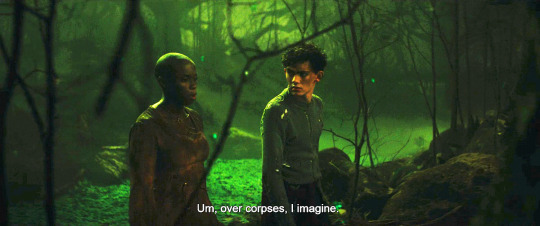
jen filling the gaps with her own headacanons, i see you girl
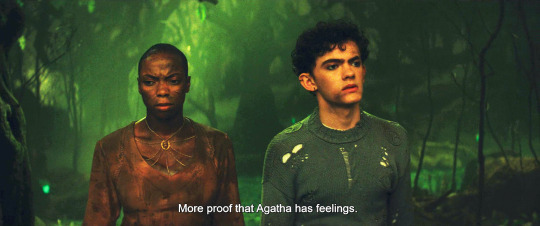
they're kinda doing their own little agatha deep dive, lol. she's a fascinating specimen, okay? don't you just want to study her in a petri dish?
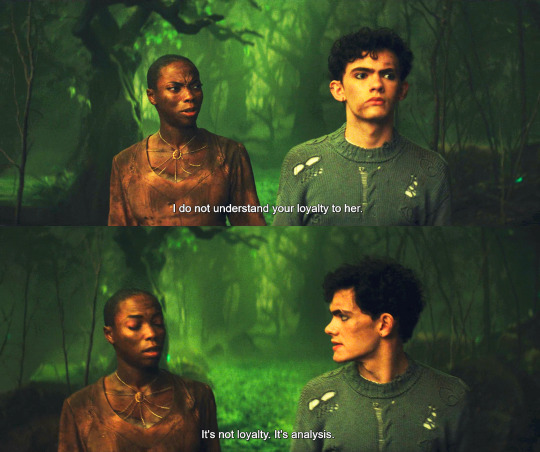
billy, who's definitely not been projecting his mommy issues on a whole coven (three dead, several unlocked traumas) and hasn't been following agatha around like a lost puppy in need of a mentor: it'S nOT LoYALitY It'S AnALYSiS
that's agatha's entire son, dear lord. 'maximoffs are so dramatic' my ass.

YOU'VE BEEN TRYING TO VIOLENTLY SHOVE HER IN THE WARM EMBRACE OF A COVEN FOR THE PAST THREE TRIALS. for fuck's sake, william.
he's acting so mature and cynical when in fact he's so hurt about the people who died and about agatha's betrayal. he's putting up barriers, he's trying to trick himself into not caring, when crying and letting himself mourn would be much healthier responses! in other words, he's learning alllll of agatha's shitty coping mechanisms.
no but I won't shut up about this, it's the kind of psychological response that really fascinates me. billy has had to learn to lie and censor his true self because he doesn't want to upset his parents. he went through something EXTREMELY traumatic (reincarnating in someone else's dead body? hello?) and he can't process it with the kaplans, he knows it would hurt them too much.
so he finds agatha who is, on paper, someone who can absolutely understand what he's been trough and could totally help and guide him. he's tried to win her over, he's tried to open up, to understand her and to be understood in return. and agatha, DESPITE LOVING THIS KID SO FREAKING MUCH, is so EMOTIONALLY CONSTIPATED that she has rebuked almost every attempt at a deeper connection. and when you do that to a kid, not only you hurt them, you teach them by example. billy is not mature enough to be the bigger person, he sees agatha hurting him, he'll want to do the same. that's the kind of shit parents imprint on you that will be hell to unlearn as an adult.

agatha, who is - I promise you! - truly hurt by billy's words: ahahaha ouch!
I want to strangle her

one moment of silence for jen who's now alone and stuck in the middle between these two
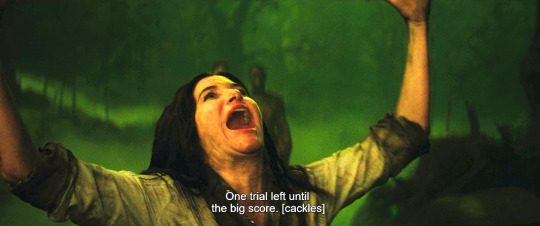
agatha has somehow managed to sell billy's immortal soul to her ex wife while ALSO breaking her own heart's AND said wife's heart in the process. and she's having A TRULY NORMAL ONE about it.
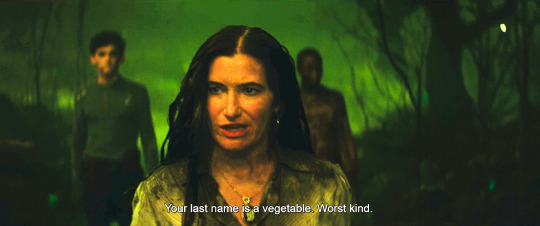
aaaaand she goes straight for jen (no pun intended). starts slow and bratty with some kindergarten insults.

OUCH, AGATHA. WHAT THE FUCK?!! AND TWIRLING YOUR HAIR?!
YOU FUCKING BITCH.

oh dear lord look at jen's face. this is actually the first time I see everyone's faces (fuck you lighting department) and it's making agatha's behavior even harder to stomach. and yes by the way, this scene is absolutely a metaphor for microaggression. knowing that jen's big moment is coming is only a half-consolation.

also agatha falling on her face, that's maybe a quarter of a consolation.

of course it is. this is the green witch trial, it's about the circle of nature, it's about life and death beginning and ending and beginning again.

here comes the tantrum!!!

now she yells at billy. and he scrambles to justify himself. this is funny but also SO FUCKED UP??
lilia when billy makes a mess: that's okay baby I got you.
agatha when billy makes a mess: oh are you having a problem? I'M GONNA MAKE IT ALLLLLL ABOUT ME! I'M GOING TO MAKE IT FUCKING WORSE!!!!!!!!!!!!!!!!!!!!!!
(fuck she's literally my dad. jac schaeffer I'm sending you my therapy bill)

so, anyway. if a parental figure does this to you? they're being vile and immature. I don't care if they've got their own issues, this is abuse.
(and frankly, learn to recognize this pattern in friends and partners and family too. but it's especially egregious when it's done to a literal child.)

and billy going from apologetic to stone faced. barriers up. he needs to protect himself from her.

while agatha huffs and puffs, jen quietly gets on her knees when she sees the shoes. the camera goes from sharon's shoes to lilia's to alice's.
you guys, this episode is... it's so good? it's not in-your-face like episode seven, but it's doing a lot of subtle things that are getting under my skin

agatha of course plans to barrel through her problems like a rouge zamboni, and just look at jen's reaction! I'm astonished at what sasheer zamata is accomplishing in this scene. I admit the first time around I was too fascinated by hahn chewing scenery to look anywhere else, I got a poorer viewing experience for that. jen has had all her walls up, she's been doing her one note mean girl bit for seven episodes. look at her now. she is crumbling.
god I love me a show that takes very funny characters and let you enjoy them only to pull the rug from under your feet and go: now let's examine why all their funny traits are fucked up trauma responses!

JESUS CHRIST AGATHA

agatha notices billy looking at the shoes and of course mocks him about it. what are you going to do, pay actual respect? cry and properly mourn? like some weak baby???
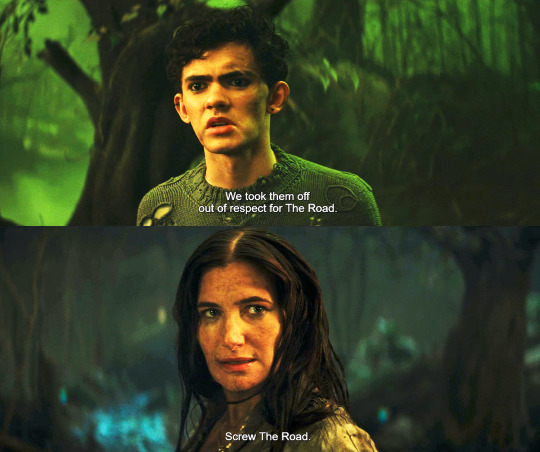
pay attention now: billy gets mad, and agatha suddenly looks at him with interest and, dare I say, expectation? was she provoking him on purpose?
yes, yes she was. that's the evil of agatha harkness. and I'm not saying her tantrum wasn't real, she was absolutely upset and she relished pouring all her spite and anger and desperation into it. but agatha's theatrics are always happening for a reason. when she's alone she's much more subdued; when she's in public, she vents out her overwhelming emotions trough a big fucking show, so she can make it everyone's else problem. that's the equivalent of when an abuser throws a tantrum and somehow always ends up breaking your stuff, never their own. it's both self-soothing and a scare tactic, two birds with one stone. that's why she went after jen and immediately taunted her about lilia. her words were precise and on target. she enjoyed watching jen squirm.
and yelling at billy just now? it was another one of her calculated risks. what billy is going to do next is anyone's guess, but at least they're not stuck on the Road any longer.
I don't know if I'm making myself clear enough. it's like, how can agatha be so smart and such an idiot at the same time? because she's a coward. because she chooses to. because the alternative is facing her own fucking issues and admitting the truth.
and the truth is scary. the truth is too awful.
next up: billy lands them at the morgue.
great job there, agatha!!
go to episode 8 part 5
123 notes
·
View notes
Note
Depressed!anon here. Thank you for inspiring me 💜 heres the concept for my goofy lil oc(art coming soon)
---
OAKE 13 Model-D, The Ochre City/ Oakley, the Wistful Vivarium!
A multi-die Puppet designed as a moving city, meant to be capable of housing a sizeable population. Well, for the rich, of course. Multiple soul dies were used to make the entire city move, with Oakley at the head, and seven additional soul dies for the legs, windsails, and tail of Model D. OAKE stood for Oct-Alma Automotive Kinetic Environment, with three models being prototyped. OAKEs never made it to full-scale production, due to the immense resource requirements and the fragility of the sanity in the soul dice. Oakley was one such prototype, Model Dragon.
As 13 M-D, Oakley was old enough to witness the fall of humanity. His immense body contained a giant vivarium, a completely enclosed mobile city. As the other seven soul dice slowly became corrupt and caused the destabilization of the vivarium, Oakley did his best to lead his collapsing body to what he hoped would be a safe haven, before he too gave into madness. He gave up his fight not far from the City of Circuits, an immobile head attached to a rusting hull.
As a rebuilt Puppet, Oakley has a smaller frame, and his own body for once. Now a dragon Animatronic, he can freely roam to his heart's desire, providing a method of fast travel for Pomni when they cross paths. Oakley's one and only wish is to see the world rebuilt.
WOAH
WOAHHHHHH
WOAHHHHHHHHHHHH /VERY MUCH POS
if I had a nickel for everytime someone created a dragon OC with such a fleshed out and intriguing concept for this AU, I would have two nickels
which isn't a lot but it's SO AWESOME THAT IT HAPPENED TWICE AUGH
My brain immediately thought of Shadow of the Colossus for this big guy and I think that's so amazing, I LOOOOOOVE giant creatures colossal beings my absolute beloved I wish we had them in real life but as friends
I'm getting sidetracked I'm just so excited for this concept like WHATTTT, A GIANT MECHANICAL DRAGON THAT'S ALSO A FLOATING CITY?!??! FOR THE RICH!???!?!?! I WANNA SEE THAT SHIT JUST TO WITNESS HOW SUCH A THING TRAVERSES FROM POINT A TO POINT B AUGHHHH THAT SOUNDS SO COOL (but also... very tragic.... 7 dices were used... containing multiple souls... Oh, these poor, tragic people who had to be subjected to such cruelty. I hope they found peace somewhat, if the dices were destroyed)
The concept of fast travel was something I've been considering for this AU too, mostly with the idea of "soul magic + device that causes object displacement" (or more commonly known as "teleportation") BUT NOPE, GIANT DRAGON NOW, LOVE IT, PITCH IT, SELL IT
(also reminds me of The Last Stag from Hollow Knight, would Oakley also be giving Pomni the option to go from city to city? All the major, largest cities of this world are neighbors, and they kinda form like, a weird giant cog)
OH, this makes me SO excited to see your concept art for it. like, oh my lord. Goodness gracious, it's going to be amazing and I just know it. As usual, take your time, don't feel pressured, I await the lad's visual concept with all the patience in the world teehee :3
#thanks for the ask!#tadc#tadc au#harlequin au#tadc harlequin au#the amazing digital circus#pomni#au oc#oc concept#WOAAAAAAAAAAAAAAAAAAAAAAAAAH#ABSOLUTELY BREATHTAKING#again take your time with this#BUT I AM ALSO JUMPING UP AND DOWN IN EXCITEMENT#I am super happy that this AU is inspiring you enough to draw again#I cannot begin to tell you how much of an honor that is#as an artist to another artist#you stay strong and you keep slaying now you hear me <3 /p
42 notes
·
View notes
Text
Maiden Astraea and the Grief of Lost Faith
Many Souls fans liken the Maiden Astraea fight in Demon's Souls to Great Grey Wolf Sif in Dark Souls, describing both as tearjerkers that made them "feel like the bad guy."
The comparison always rubbed me the wrong way—not because it was misplaced or dishonest, but because it was shallow.

It centers how the player feels, and only that. To be fair, this is an understandable response, and definitely an overt part of the text. Against both Astraea and Sif, the player's success in combat, which has thus far been their primary means of progress, is now being scrutinized in a way that casts them unfavorably. They're being forced to reckon with the personhood of the enemy, with their enemy's good intentions and noble virtues.
Suddenly the assumption underpinning most video games—that your actions are good because they're yours—is overturned, and the mechanical rewards for combat are now complicated by emotional punishment. You're fighting a good person, and so you, the player, might just be a bad person.
This is very much in tune with the video gaming zeitgeist of the early 2010s. Dark Souls released just a year before Spec Ops: The Line, which does this same trick on an enormous scale, to well-deserved critical success. Players are placed in the mind of a paranoid American soldier in the Middle-East, and slowly slip into moral depravity as they go from "fighting terrorists" to "suppressing insurgents" to dropping white phosphorous on a refugee camp.
"Are we the baddies?" was really quite a novel idea at the time. It was novel enough that it could be the driving thesis of an entire game.
Perhaps this is why it still stands as the prevailing sentiment around Maiden Astraea—especially when Great Grey Wolf Sif, whose boss fight falls pretty squarely in line with the trend, is such an immediate point of comparison.
But the fight with Maiden Astraea and Garl Vinland is saying something more than that, I feel. The comparison to Sif is what crystallized this vague feeling into a clear, certain thesis for me. It's not just that the player is set against someone "good" or "noble" in Astraea, in the way that Sif is a good dog.
Astraea sets the player against someone human, who is experiencing the height of human loss: the loss of faith.

On some level, all of Demon's Souls is about our human yearning for the sublime, be it supernal or infernal, and the horrible failure that comes when we reach too far.
King Allant reaches for sublime power. In so doing, he achieves a new perspective that shatters his previous understanding of the world—including the values of feudalism and nationalism that drove him to seek power in the first place.
Sage Freke reaches for sublime truth. He believes that with knowledge that is normally forbidden to mortals, he can achieve the just and equitable world that is normally denied to mortals. In the end, however, he fails to consider his own mortal limitations, and he succumbs to the influence of the demon souls.
So on and so forth. The pattern is a familiar one. As Arthur Machen says in his supernatural horror story, "The White People," true sin comes in the "attempt to penetrate into another and higher sphere in a forbidden manner." This plays out with many key characters of Demon's Souls, each one exploring this cardinal sin from a new angle.
Saint Astraea does this too, yet she does it from an angle that I, as a former Catholic, find uniquely sympathetic. It begins when she reaches out for God, and catches only empty air.

"Dear Lord, you are too cruel... You have abandoned us. Is that not punishment enough?"
It's never stated what exactly causes this realization in Astraea—that the God of her world is a distant watchmaker at best, a cruel absent parent at worst. It could have been a direct revelation, such as King Allant received from the Old One, but this doesn't seem likely.
From what the text offers us, I think that Astraea's faith was broken by the Valley of the Defilement itself.
We hear from Biorr that King Allant "fought vigilantly against the vile and depraved," and we see through Yuria's torture that these labels were used for people on the fringes of society, to justify their persecution. Surely this extends also to the "lost and ill-fortuned souls" who were driven to the Valley of Defilement. The land was presumably called the "Valley of Defilement" well before the demon scourge broke out, and so it's the inhabitants themselves—the poor, the diseased, the unwanted—who are the "defilement." Them, and the rubbish and waste that are disposed of there.
The fact that we see aborted fetuses at various points throughout the Valley, mingled with the muck and the refuse and the remains of animals, speaks to the dire state of living there. As the filthy beggar woman says, it's "all the rot of the world, living or not," and it leaves no room for sanity or dignity.
Whatever can be said of the exact circumstances that produced this, or of the land itself, the fact remains that the misery of the Valley's inhabitants is of decidedly human origin.
Bear this in mind when you consider that the Church of Demon's Souls sends missionaries there—as if the Valley folk were suffering from some natural calamity, and not from the malice of the ruling class.
Perhaps that's all the Church could do. After all, the real-life Catholic Church has always been a powerful political entity, but never have they been able to erase poverty or prejudice, or directly stop a monarch from doing something. The same must apply to the definitely-not-Catholic Church of this fictional world, which is pretty committed to realism in that regard.
But even so, it should come as no surprise that every missionary who entered the Valley of Defilement was killed, either by the people or by the land itself.
These missionaries come from the very society that drove the Valley's inhabitants to such inhumane lows. How would they, who live in relative comfort, know how to navigate this treacherous hellhole? And why would anyone accept charity from the hand that beats them down?

So when Saint Astraea enters the Valley of Defilement, full of genuine compassion and goodwill, what does she see?
She sees the sheer magnitude of human suffering, the depth of the squalor, the inhumanity that it represents... and no relief from anywhere. Not from the Church she serves, and not from God on high. Not even in this end-of-days scenario, when demons walk the earth and miracles are witnessed again, does God's supposed mercy reach the Valley.
Saint Urbain might be a deluded, bigoted fool, but he might not be entirely wrong when he calls the people of the Valley "those left behind by God." Perhaps all of mankind has been left behind, and only in the Valley of Defilement is that truth laid bare.
What can anyone do in the face of such a horrible truth?
If you don't run away from them, how do you answer people who are suffering and dying on this scale? If they need miracles, and God does not provide, what do you do?
These questions don't pertain solely to the fiction of Demon's Souls. These are questions that have echoed across human history, philosophy, theology, and myth. Reckoning with the impossible scale of human suffering—the inevitability of it, the ubiquity of it, the horrible depths of it—has been the preoccupation of our greatest thinkers for, well, pretty much all of our time on this planet.
Even when some of us arrive at an answer, it's never a wholly satisfactory answer, and it's usually contingent upon an existing framework of values and beliefs. The Pope says one thing, the Dalai Lama says another, so on and so forth, and the greater share of humanity continues to suffer all the while.

As for Astraea's answer, I'll once again quote the prologue to Machen's "The White People":
"[H]oliness works on lines that were natural once; it is an effort to recover the ecstasy that was before the Fall. But sin is an effort to gain the ecstasy and the knowledge that pertain alone to angels, and in making this effort man becomes a demon."
She does this quite literally. She cannot access the power of God, so she accepts a demon's soul, and uses its power to bring relief to the Valley of Defilement.
Because this power is infernal, not supernal, she cannot purify the foul stagnant waters of the swamp, nor can she cure the diseases of the poor. Rather, she gives the Valley's inhabitants an affinity for filth and disease; it becomes their sustenance rather than their bane, their strength rather than their weakness. The natural order is inverted completely.
This is why Astraea is "the most impure demon of all." Her demonic power imitates the divine mercy that she longs for, yet the results couldn't be more different—perhaps, also, because she extends her mercy to those deemed impure themselves. The description of the spell Death Cloud, made from Astraea's demon soul, says as much.
And in a cruel twist of irony, Astraea's damnation does not ease the pain and misery of the Valley's inhabitants. The Archstone before Astraea's boss room reads, "The poor journey to this rotten place to offer their souls [to Astraea] so that they might be freed from their suffering." They might be sustained by the Valley's filth now, but they are still suffering from it.
They find lasting relief only in giving up their souls to feed Astraea's power, thus perpetuating the whole horrible system.
Astraea's wounds bleed perpetually, never closing, never healing. Her blood fills the grotto where she sits as an object of adoration, still performing the functions of a religion that failed her. All she can say, over and over, is that God has abandoned her, abandoned the world—she has no fewer than three separate voice lines saying this.
Notably, though others might call her a witch, she never turns to "witchcraft" in the archetypal sense. Her grief never turns to anger; she never rails against God. She never discards her clerical robes, she never dons a pointed hat, and she never casts curses or spells. She is stuck as Maiden Astraea, Saint Astraea, frozen in a state of loss.
The moment of her trauma, of her loss of faith, is extended into perpetuity. Even the boss music reflects this:
youtube
The melody loops and loops and loops, and any resolution feeds immediately into another loop. It's a textural piece more than anything, but you can't help getting lost in the endless repetition of that simple, incomplete melody.
Astraea's knightly bodyguard, Garl Vinland, also seems to be lost in unending grief. He rests in a pile of corpses, never removing the armor that is the sign of his holy vow. If you kill Astraea before him, he simply stands in shock, unable to move or speak or act. Unable to move on.
Anyway, uhh...
All of this? A wound that never heals, a grief that never ends?
Yeah, that's... that's how it feels to have lost your faith.
That's how I feel, anyway.
As you probably gathered already, this reading of Astraea is informed by my perspective as an ex-Catholic, now agnostic. My own loss of faith was very painful. It spanned the entire length of my adolescence, into young adulthood—as my rational mind was growing, my queerness was rising to the level of conscious feeling, and nearly every support system in my life was failing me.
My parish community was run by hypocritical bullies, and harbored an actual, real, pedophile priest, but still I reached out to God for answers. I looked to theology instead of community, to study and meditation and prayer. I looked for answers to my own suffering, and to the world's suffering. I looked for resolutions to all the insane contradictions. I looked for something to sustain the faith that was being asked of me. Surely God wouldn't abandon me, even if my parents and teachers and peers were all against me.
In the end, it all fell out from under me. I found plenty to admire, but even more to doubt and disdain.
I couldn't stop loving God or Jesus, but now it felt like they were dead at my feet, and that rot and maggots were visibly eating the corpses—and that everyone around me was politely pretending that they weren't.
I remember crying to my mother when my dog died around this time, and she tried to comfort me with talk of heaven, and I was just inconsolable. All I could say, as I cried for this sweet little animal who had loved me, was that I was "scared for the world." That nothing could ever possibly be right, nothing in the whole wide world, if God weren't there. I could no longer imagine a good, just end to any human life or endeavor, because the only end was death.
I've since recovered from that very low point in my life, and grown into a much happier adult. The grief never left me entirely, though.
The loss of my faith is likely the single most impactful event in my life. Because I'm no longer Catholic, I was able to transition, and I was able to find friends and partners who mean everything to me...
...but because I was Catholic, and still feel that small aching hole inside, I've spent the greater part of my life immersed in art, literature, and philosophy that explores the space where God once lived in my heart. I've spent years studying apocalyptic religions and their various underpinnings—political, social, theological, and narratological. I've become a literary critic, and a scholar of Victorian religion. My first published article is about how Elizabeth Gaskell positions the Victorian working class as an "apocalyptic demographic."
My favorite musical is The Hunchback of Notre Dame. My favorite author is Arthur Machen. My favorite video game is Demon's Souls. The grief that I feel for my lost faith is hardly all of me, but it has touched every part of me.
So when people who have never experienced such grief compare Maiden Astraea to the big sad wolf from Dark Souls, I feel a little frustrated. As a character and a symbol, she's so much more than that.
I could go on, and resolve this rambling, messy, emotional essay in some kind of critical statement about Demon's Souls... but I think I'll just leave it at that. I suppose I just wanted other people to understand what I feel, to see what I see, and to know why this video game is special to me.
If you made it this far, thanks for reading. Umbasa.

#Demon's Souls#Maiden Astraea#video game analysis#personal essay#religion#Catholicism#Apostate#ex Catholic#FromSoftware#Dark Souls#Youtube
37 notes
·
View notes
Text
hello it is 3 am today we talk about kid’s humanity and how it is vital to him being the way he is mainly by comparing him to the other two shinigami we see in the series. if u expect a coherent structure my excuse is that it IS in fact 3 am and i just woke up from my slumber
but Kid is a character who is mainly defined by three things:
1. He has a huge amount of skill and power alone
2. It is typically overshadowed by his need for perfection
3. He is human. He is also Lord Death’s son.
now, one of these holds seemingly conflicting traits: how can Kid be human if he’s Lord Death’s son? Well, he’s not. He says as much. He’s not human and he’s very easily able to identify this fact. So, how IS he human? How can something inhuman become human?
This , listeners in my walls, has an answer that can be considered very simple:
Lord Death INTENDED for Kid to be human. He intended for humanity to become an integral part of Kid.
At the time of Lord Death’s creation, we understand that inhumanity is needed to deal with immediate threats while humanity is still trying to thrive. This is showcased to us by how Lord Death creates Asura, deals with the Witches, and overall eliminates threats. He’s quick, decisive, and seemingly without any regret. Lord Death does what is best for humanity with a stern hand because that is his purpose initially: to be a present god for humanity, to light the way. Now a god is not, and never will be, human in the ways that they need to be. Especially in Soul Eater where almost all depiction of a god or god like character have them be inhuman in some shape or form. Eibon, Excalibur, the Great Old one of Power, and even Asura have appearances that can be considered monstrous: they are not human.
Speaking of Asura, I would like to call Asura a case of incomplete humanity in the wrong era. Asura is the embodiment of Lord Death’s fears culminated into a person, he did not grow up with a childhood, he simply just was. This, as everyone knows, has had a very negative effect on Asura and led to him becoming paranoid and yearning for power. He is an incomplete human who’s not quite god in the way Lord Death or Excalibur are, but not quite human either. But since he’s not quite human, Asura easily falls into morally wrong temptations to achieve power that would take some or most people at least a few more days of contemplation, and he does so without a drop of guilt or remorse. Can you imagine the absolute betrayal Vajra must have felt in their last moments? The horror and dread? The sadness that this is who Asura is? That it only gets Worse?
Now I mentioned Asura’s incomplete humanity but what exactly does that mean? In my opinion, Asura has some mechanics of a human— the shape to be exact and the general self preservation instincts of one. But where he fails at being human is how he operates. His own paranoia and fear drove him to madness yes but he acts in a way that feels logical to HIM. He does what feels best for himself in incomprehensible wonderland noise, the same way that Lord Death does what feels best for humanity. And because they are gods, they are correct at the time even if they are wrong eventually. Asura, despite having human-esque things about him, is no different than the other gods that walk among the soul eater world.
So how does this all tie back into Kid? Well, Kid is the reverse of Asura. Kid, rather than being an incomplete human, was made to be an incomplete GOD. Intentionally so, since it was the most logical thing to do to keep another Asura from happening. Lord Death created Kid to be an heir but he didn’t want Kid to become Asura 2.0 somehow, so he figured out that reversing the way Asura operated would do the trick. Instead of creating an incomplete human, he would make an incomplete god and that is the Kid we start out with in the manga.
This allows Kid to be human and a god at the same time, allowing him to learn humanity and understand it in ways Asura and Lord Death really just /can’t/. They CAN’T understand it, they simply just aren’t able to. Kid acts emotionally, he takes logical routes yes but he’s very emotional too. He can be impulsive, reckless, everything a human is expected to be. He has a drive to protect humans not because he simply should but because he has walked among them. Kid is friends with and cherishes so many humans, he finds the good in even criminals and that, in a new age where Humanity no longer needs immediate protection of it’s present god, is necessary now.
Kid can create peaceful solutions in place where Lord Death, who can only ever ensure the survival of humanity in a direct way, cannot. He can change and react and evolve in ways Asura cannot. He is human, and the two other shinigami are not. Not to mention, Kid is extremely indulgent in smaller human behaviors: we are shown time and time again that Kid has hobbies he has put time into like skateboarding and he will not hesitate to simply engage in his hobbies, but in comparison, we’re not really shown the hobbies of the other god characters. We don’t even know what Lord Death even does for fun, even though we know what Spirit does for fun.
But Kid’s also not human, and there’s no dissonance created either in this because he simply was made to be human. He knows he’s not human, he admits as much constantly, but he’s not broken up about it. He doesn’t feel disconnected from being a shinigami or from being human, he is both and he is what he is. He is what he was made to be, and his humanity is vital to make him who he is. Without that humanity, we’d most likely be left with something similar to what Kid became under the influence of the Madness of Power: a god determined to make the world into perfect nothingness.
But uh, this is all a 3am ramble ? so. take it with grains of salt LMAOO
#soul eater#death the kid#lord death#asura and death the kid#lord death and death the kid#character analysis#I WOULD ALSO LIKE TO ADD#the visual distinction between gods and non-gods is displayed perfectly with Asura imo?#because he has an incredibly inhuman and monstrous looking form#and a human looking form#and we KNOW that that human looking form is most likely not his true form#but Kid rarely if ever looks monstrous#he has some moments but he’s not pulling out the weird looney tunes shapes of Excalibur or Lord Death ykyk#generally: if it doesn’t look normal#its not a human guy#and kid looks really normal compared to other not human guys (the witches#kishin asura
71 notes
·
View notes
Text
The Dragon Prince Thoughts 6x05 - Moonless Night
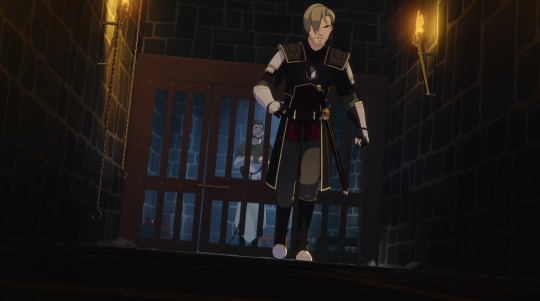
Previous Episode // Masterlist // Next Episode
Join the Taglist
Spoilers under the cut

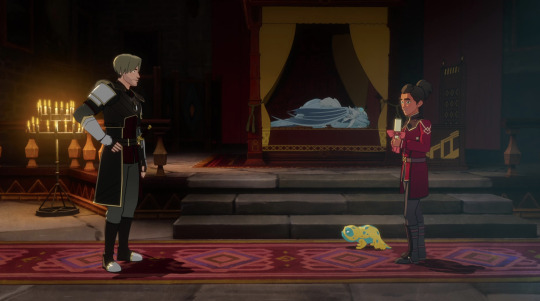
“Oh, don’t worry about Viren, everything will be fine.”
Did you notice the way Soren hesitated when addressing Viren by his name? gahhh this poor man deserves happiness why can’t he get a breakkkk—
I wonder if they’re gonna pull some “Father-Lord” shit like Zuko and reference atla
THE WAY HIS FACE FALLS THE MOMENT HE LEAVES THE ROOM 😭😭😭😭
*crying noises*
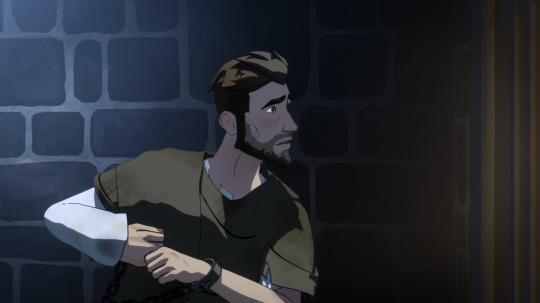
“Oh, Soren, my son. Is that you?”
Woah Viren’s been in that cell for a while
There’s gonna be so much to unpack here watch
The way Soren absolutely refuses to look at Viren speaks volumes he’s so done taking Viren’s shit
And it’s the one time Viren isn’t giving Soren shit but he’s burned their bridge so badly Soren’s lost all faith and respect
Not to mention Viren took Claudia away from him too in a way
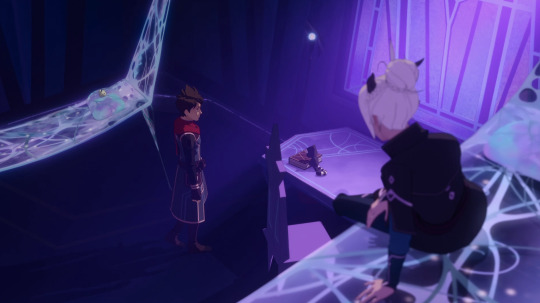
Lmao why was stella trying to steal callum’s book—
I wonder if Rayla learned that lullaby she’s singing from her parents
OOH or even runaan or Ethari—
Nah my bet is her parents
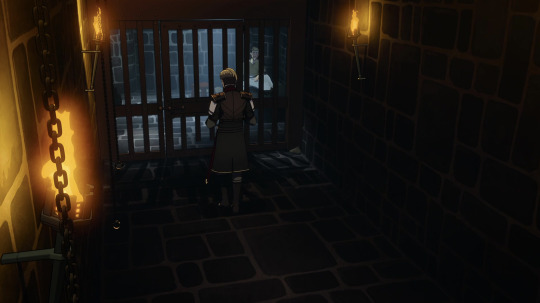
“Maybe I just want to see you suffering.”
Okay the repetition of the scene is totally intentional what are they trying to convey
Why does Soren keep going down there to see Viren when he knows all Viren has done is hurt him? What does he want?
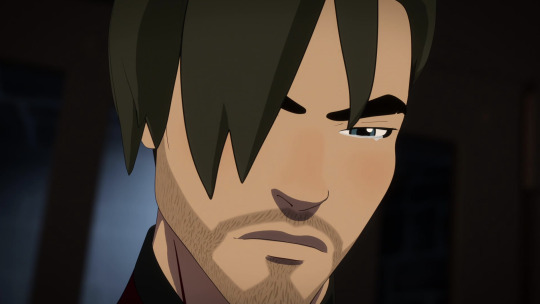
“But with my eyes open, I also see… you.”
NO CUZ it’s the way Soren IMMEDIATELY starts crying when Viren says “you”
Like all he ever wanted was some form of acknowledgement from Viren his WHOLE LIFE but now that he’s got it it’s too late
Soren desperately wants to believe Viren but he’s been hurt so many times he doesn’t allow himself to
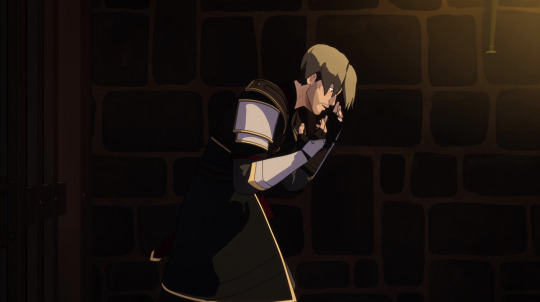
“Everything you’re telling me is… is some kind of lie!”
SEE THIS IS WHAT I MEAN
Viren has given Soren some serious trauma and self-worth issues, and even after two years of virtual peace, he’s still keeping it in
Everyone he trusted either didn’t care or isn’t even present in his life (lissa), so he always kept it in, using his “class clown himbo” facade as a coping mechanism
But now that his entire childhood trauma is literally sitting there staring at him he can’t take the idea of working through it all and that’s why he blew up
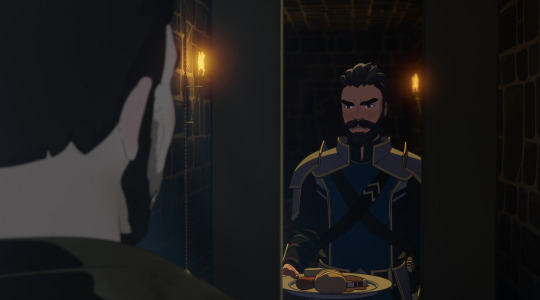
SEE NOW HE DOESN’T WANNA TALK ANYMORE
I wanna say he’s just not ready to face Viren but at the same time I don’t think he’s ever gonna be ready he just has to take the plunge
Wait is that Fen—
I thought he was with amaya in xadia
Did he get demoted lmao—
Wait does the standing battalion outrank the crownguard or the other way around
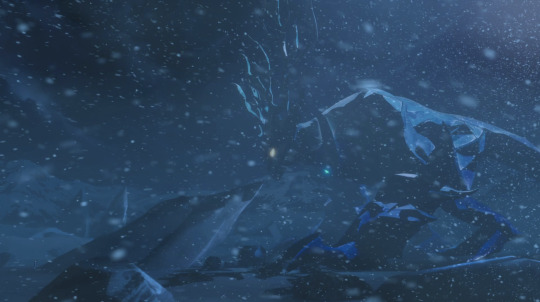
“On moonless nights you miss her the most.”
That is so sad omg—
Luna Tenebris disappeared centuries ago too so Esmeray’s been hurting for a really long time
Imagine that i could never 😭
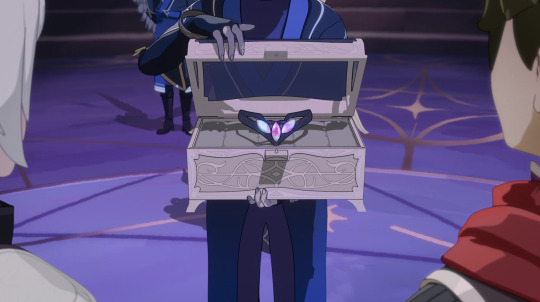
“It’s the Corona of the Heavens.”
WAIT I THOUGHT VIREN’S STAFF HAD A QUASAR DIAMOND—
If all 3 are in the crown wtf is the stone in his staff
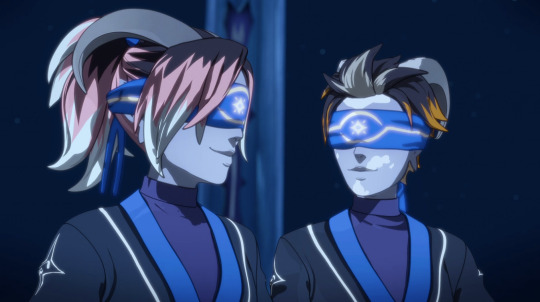
OH THE BLINDFOLD DESIGNS ARE LITTLE EYES I SEE IT NOW
OH WOW KOSMO’S CONNECTING TO THE STARS
Just like that huh
WOAH KOSMO PREDICTING FUTURES HERE
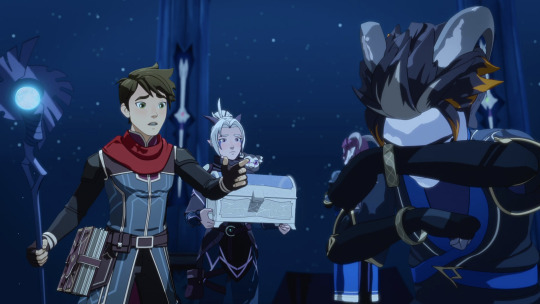
“But your path is… darkness.”
Does that mean callum is still on the dark path aaravos was talking about in s4? Or is kosmo just reflecting callum’s soul from his past usage of dark magic like how sol regem sensed it
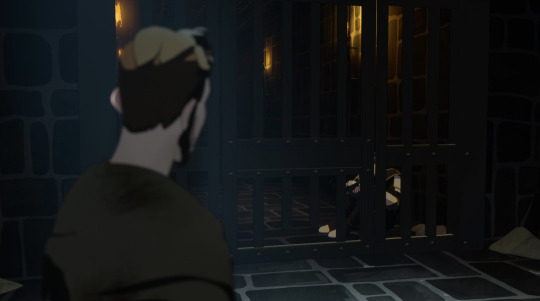
Oh? Soren’s back
I wonder why he went back
“If you do not accept my words now, Soren, I want you to have them in the future… when you might need them.”
Okay nah this has got to be foreshadowing or something wtf is going to happen to soren—
Omg this was essentially a soren character study sorry lmaooo. I’m not too learned in trauma and all that stuff this is just my take on what’s going on with him I’m just really invested cuz he’s my bbg princess and i need him to be okay 💀
ANYWAYS considering that Rayla really connected with Esmeray in this season i wonder if she’s gonna have some plot relevance later on (i hope so esmeray is fuckin cool) especially cuz even kosmo commented on it and he can see the future. Soren BETTER BE OKAY by the end of this season i can’t take his pain 😭. And also i am SO EXCITED for rayla to see her parents again and for runaan to FINALLY go back to ethari like he DESERVES GAHH—
But yeah good episode good episode 👍

#the dragon prince#tdp#tdp 6x05#tdp spoilers#fandom#tv review#lei's laments#watch a thon#discussion#thoughts
21 notes
·
View notes
Text
How are orcs made?
(...also, a bit about Maeglin) Elaborate HC, long post.
TW: discusses breeding of orcs (no descriptive language etc, but implied sexual violence. Also, mentions / implications of torture, child abuse, and domestic violence. Probably something I forgot... generally: it's about orcs. Canon-Typical Level Of Disturbing
I was watching more lectures about Tolkien's later writings, and another discussion of orcs got me thinking: what if it's not one answer, but many? This would solve some problems, paradoxically.
So, I propose
1st gen orcs are indeed corrupted elves (or also men, both can work). The physical corruption (including the hroa being not fit for the fea, which in mundane terms, includes many neurological imbalances leading to mental issues) is partially hereditary.
It is there but it weakened with each generation.
They do have souls, of course, and their kids (orc+orc kids, orc+ elf kids, orc+human kids) have souls, because that's how having kids works. Souls aren't initially corrupted, because Melkor can't make it so, but the physical problems + traumatic upbringing (violence both from family and by a Dark Lord) make it hard for those souls to be good.
This makes them insubordinate and rebelious, but smart. (here we can have rebellious orcs)
However, if such kids are not "worked on" (ie additionally corrupted in the same way as orc-making process, they just need less amount of it), with a few generations they revert basically to Elves, physically and behaviorally. I'm sure it had happened many times in history, whenever the forces of evil lost control over some area and orc tribes were left unsupervised.
However, working on may be (and likely was) imposed on their culture, so that even without external supervision they would keep orkish for more generations than they would without it. Unless something disrupts the mechanism.
What life spans do they have? OK, that's a hard question. I would say that there is a threshold of corruption, and more corrupted elf-orcs have long but finite lives
What's with their souls? Mandos, some are locked indefinitely due to Namo not being able to fix them, as per Tolkien's notes. Some get better.
Also, as with normal elves, any human ancestry => the base type is human.
Maeglin (and also Eol). We know Eol was Thingol's family. I propose: one of his parents was someone close to Thingol, the other was a descentent of orcs, but at this point elvish enough for them to legit fall in love (yes, let's make it not-that-traumatic). still, there was probably violence in the family, and Eol had some genetic traits that made it harder for him to make good life choices. (Also, generational trauma of hiding from being recaptured => his isolationist tendencies)
But why do I focus on Maeglin?
Maeglin gets captured. He isn't tortured. He is simply informed what he is. What his ancestors were. What he can again become.
He is given a choice: share the location of Gondolin willingly, and get some instruction on how to better side and soothen your physiological issues, then go home. Or not share it and become as your ancestors were. And then you will share it anyway.
Still I don't consider him a good guy but in this scenario he's less guilty of all his BS (and so is Eol) and the location-of-Gondolin business is outright understandable (lack of estel, sure, but who doesn't lack it? even the Valar have issues here.). Also, after the betrayal he had a lot of time and he could and should at least run away from the city leaving a letter about what he did. They would evacuate.
Anyway back to orcs.
Another type of further-generation orcs: the soulless. I'm not sure whether some kind of magical cloning, or something more nasty, but the result is beast-like orcs. No soul, no free will. Stupid. Ape-like but there are some fixes to this:
Necromancy. When you have a functional, but soulless body, some unhoused spirits may want to make a deal with you. They work for you, they get to experience having a body again.
And some spirits are to weak to protest.
Still may be rebelious, but smart and probably more powerful. Possibly cannot reproduce?
Magic AI So when Tolkien wrote the Silm, an idea of "automaton" was something primitive and not talking, so he at times had a problem with "orcs are constructs but can talk". But. Today we know how much talking can be done without a soul.
So basically, there's a magic AI imbed in each orc, probably all from one template (or a couple templates), because dark lords aren't very creative.
Still not very smart orcs, also probably need more power expenditure to create than other types. May breed among themselves (and with souled creatures) resulting in more of them, but each young still needs the AI put in. Maybe the AI-inserting process can be automated with an artifact (loaded with an amount of power to last for some time) and the orcs may be taught to deal with their newborns themselves.
To sum up: This HC allows us to have all of
orcs have free will and can rebel
some orcs don't
being an orc is hereditary (mostly) and even without a Dark Lord, orkish tribes would remain active (for some time, but we can make it enough time for the plot to work, probably, it takes generations especially if they are taught to deal with their newborns to maintain their orkishness)
We keep to the idea that Melkor cannot make anyone hereditarily evil (Tolkien thought it important)
angsty part-orc Maeglin
evil, scary ghosts of FA elves put in orc bodies (not everyone would gogently into Mandos) (Maedhros. I mean mostly Maedhros) (but also Eol would be so ironic)
some orcs are more powerful than they look and are scary
enough of orcs seem mindless so that the good guys may (tragically) assume that they all are and are free to kill. (I need a fic in which they learn)
it is natural that after Sauron's defeat orcs would disappear, but slowly, not in one generation
It doesn't allow us to make the "killing orcs for sport" non-evil, but it allows us to make it a "they didn't know and had reasons to assume" kind of evil, ie doesn't make the protagonists of LotR evil. (just tragic but I can live with it)
#TW: canon typical level of disturbing (orcs)#silmarillion#tolkien#silm#tolkien legendarium#the silm#the silmarillion#nobilis#long#orcs#where do orcs come from#maeglin#eol
30 notes
·
View notes
Text

Character : Alhaitham
Mentioning : Kaveh, Cyno, Traveler (not you guys).
Themes : Self awareness, different dimensions, posesif (ig-)

Alhaitham knows who you are. And he won't let you go that easily ferguso.

If asked what he thinks of you, Alhaitham will find you an oddball who likes his stubborn personality. Even though he had never met you before. Even Kaveh, who just lives with him, can't stand his arrogant attitude. Yes. Bulliing Kaveh is one of his many hobbies when he gets bored dealing with his work as a scribe and acting grand sage besides reading tons of books from the House of Daena. Take the uwu lion key from Kaveh. (Didn't expect Kaveh himself to like that cute wooden lion. Who knows. I don't know. I'm just assuming)
There are rumors that people with vision will get closer to you. Look, how lucky are the vision holders. they thought. Alhaitham did not bother. He had had enough of the other ramblings of academiya students. They tried to bring other gods closer after dumping Leser lord Kusanali and trying to create new gods and now they are seeking new divine knowledge from you. How selfish are they.
In addition, they are trying various ways to get vision quickly with research and research on 101 ways to get your vision quickly (life hack. Very helpful so that you live in prosperity so that you are closer to you. No clickbait. Very helpful in getting divine knowledge with joss - fast. Guaranteed you won't lose. Money back isn't effective. If the transaction money is still with us-) what a crazy marketing technique.
Alhaitham doesn't expect anything other than peace with his boring activities which are waking up, going to work, not forgetting to have breakfast, coming back at night, not forgetting to bring the key to the cave every day when he goes to work as the acting grand sage. I swear, Sage Azar is really a burden. It's been a problem, he also has to replace him. Look, how displeased the academia were with her decision to become a provisional grand sage. Let it be, he has no interest in becoming a sage because it takes a long time to find a replacement for a new sage. After all, he would not even offer to become a sage because he was appointed by Lord Kusanali because he could be relied on.
Alhaitham doesn't expect anything but peace while drinking coffee alone at home while reading his boring colored cover book which he often carries and reads anywhere it doesn't matter where he sits as long as he can read that book. Kaveh often complains about how bad Alhaitham is when it comes to choosing interior decorations for his old and boring house. His aesthetic architect's soul was terrified to see him. (I swear, what kind of knowledge book is this kid reading that is so engrossed, Paimon herself gets dizzy just reading a few words)
His calm changed when he saw several meteors falling-eh.. Shooting stars I mean. Many stars fell in the sky that night. Blue, purple.. It is said that there is a time when the god gives mercy to the chosen one. The dendro vision on the wrist of the right arm shines just as a golden star falls down in Sumeru's night sky. Just then Alhaitham heard someone's voice enter his head.
"Welcome home, Alhaitham."
When asked how he felt when Alhaitham faced someone who sounded similar to what you sounded like, his ignorant soul became curious. Is that you? The God who gave divine blessings to the academic scholars?
"Acting Grand Sage, I would like to report on the results of the research I got from The Dune of Carouses together with Cyno this afternoon." You said while opening a small note sheet of your research results.
"So after I researched at The Mausoleum of King Deshret before..."
Alhaitham stared at your figure speaking in a voice similar to the one that came to mind at the time. Your voice was only faintly heard while you were talking, since Alhaitham's mind was only roaming about you.
"..I found some hidden mechanisms related to some of the theories I came up with. Regarding that because it requires entry with the Scarlet Sand Slate, fortunately there was help from the Traveler in this research with the Scarlet Stone he obtained back then..."
Alhaitham cleared his throat making you look up at him. "Yes?" You tilted your head to look at his tall figure. "Anything to interrupt?" maybe he cleared his throat because the delivery of your report was not appropriate?
"No, actually I was just curious. I was wondering, is it true that you ■■■■?" What an awkward question from him to interrupt what you are talking about. You only reacted by furrowing your brows at him.
"That's right. Are you tired? Need to rest? Should I not disturb you for now?"
"No, just curious. I just adjusted the name of your previous report notes".
"Oh really?" you raise your eyebrows. What's with this guy today?
"And the names also happen to be similar." he said rubbing his chin as if he was thinking.
"Alhaitham? Someone like you has acquaintances? What a joke. Besides, the name ■■■■ is the name many people use. Not just one." You sweat a little, flicking your palms forward.
A few months later, you told Alhaitham that once you graduated from Akademia, you would not continue your course. You will move to Fontaine to study mechanical engineering. I don't know what got into Alhaitham, he insisted that you stay in Sumeru. But you also insist on saying you can't stay in one place. After having a fight, you finally got tired of compromising with Alhaitham and ignored him for a few days.
Alhaitham is not stupid he knows you are hiding something. And you're not very good at lying, it seems.
So he has to find out for himself. Alhaitham saw some of your reports scattered on the table. It seems almost finished. He looked at you with his head asleep on the table. You're pretty diligent for a scolar like you. Just a little more and you graduate from the academy. You don't want to admit and you don't want to say that Alhaitham helped you a lot. What a tsundere—
Your graduation day is only a few weeks away, you have prepared all your thesis that only needs to be sent on the table. Alhaitham again saw you sleeping peacefully on the table. He sat next to you and pulled your left shoulder to lean on him.
His eyes stared at your face, and smiled faintly while playing with the ends of your hair. Alhaitham took some papers from your research on the table and read the writing. Your writing is really neat.
The next day you panicked into Alhaitham's study by breaking down the door. "Alhaitham—!" You hastily take a breath. "E-everyone, all of my theses are gone!"
"Oh?" Alhaitham looked at you with a flat gaze.
"Calm yourself,"
"Oh? Oh, you said it?! How many months do you think it took me to do that Alhaitham!?" you broke the table.
"All my work is gone! I-I don't know what to do! Without that thesis I can't graduate—"
"Alhaitham—you must help me!" you pulled his collar.
"I said calm down, you can still work on it again. There's still next year for graduation." Alhaitham patted your shaking shoulder.
"What do you mean-" your eyes widen, shaking and looking down. "D-don't tell me.. Alhaitham, you did this?"
"I don't-"
"Why did you do that to a scholar under you Alhaitham?! You know that's a offense right? Alhaitham you bastard. Give me back all my thesis papers!" you shouted angrily at him. "I didn't take all your thesis papers." he said sarcastically.
"Liar! I believe you were the last to stay at the House of Daena, right? There weren't many people there lingering until midnight there."
"What if you misunderstood? What would you say hm?" his gaze on you was condescending. You hate that look.
"I—" you gritted your teeth in annoyance. You swear, this guy is a complete asshole. "If that happens, I still don't apologize to you." You let go of Alhaitham's collar roughly. "I don't want anything to do with you anymore!"
You stepped angrily to get out of the Grand Sage's room, but were blocked by Alhaitham by slamming the door pushing you closer to the door. You stare at him resentfully. "What the hell are you—!"
"You.. you know how annoying you are lately?" Alhaitham muttered softly in a heavy tone in your ear while leaning back. "You sicken me." he muttered in a thunderous tone as he placed his finger on your hip. "I know who you really are. And I'll make sure to teach you who you stand for. And you won't be able to go anywhere.♡"
»»-----------fin-----------««

✄┈┈┈┈┈┈┈┈┈┈┈┈┈┈┈┈┈┈┈┈┈┈┈┈┈┈
Boy, it's been a long time since I've made this fanfic that I've been struggling since February.😰 It's been 4 months since I abandoned it because I had writer's block.😭🤙

And the ending doesn't match the initial concept that I wanted. But because I'm still innocent for results that are a little more intimate. Forgive me. 🙇
#yandere al haitham x reader#al haitham x reader#self aware genshin#yandere genshin x reader#alhaitham x reader#genshin x reader#Alhaitham x reader#genshin impact
146 notes
·
View notes
Text

I return once more to Simone Weil who draws us ever deeper into the mysteries of divine love and the experience of affliction. She does not shy away from exploring the dimensions of both and as one continues to read a trembling comes upon the soul as the vision of reality she seeks to express comes into clearer view. Weil relentlessly pursues the great enigma of life that is profound and fierce - the Love of the Cross - a Love that both wounds and heals.
“The great enigma of human life is not suffering but affliction. It is not surprising that the innocent are killed, tortured, driven from their country, made destitute or reduced to slavery, imprisoned in camps or cells, since there are criminals to perform such actions. It is not surprising either that disease is the cause of long sufferings, which paralyse life and make it into an image of death, since nature is at the mercy of the blind play of mechanical necessities. But it is surprising that God should have given affliction the power to seize the very souls of the innocent and to take possession of them as their sovereign lord. At the very best, he who is branded by affliction will only keep half his soul.
As for those who have been struck by one of those blows which leave a being struggling on the ground like a half crushed worm, they have no words to express what is happening to them. Among the people they meet, those who have never had contact with affliction in its true sense can have no idea of what it is, even though they may have suffered a great deal. Affliction is something specific and impossible to describe in any other terms, like the sounds of which nothing can convey the slightest idea to anyone who is deaf and dumb. And as for those who have themselves been mutilated by affliction, they are in no state to help anyone at all, and they are almost incapable of even wishing to do so. Thus compassion for the afflicted is an impossibility. When it is really found we have a more astounding miracle than walking on water, healing the sick, or even raising the dead.
Affliction constrained Christ to implore that he might be spared; to seek consolation from man; to believe he was forsaken by the Father. It forced a just man to cry out against God; a just man as perfect as human nature can be; more so, perhaps, if Job is less a historical character than a figure of Christ. ‘He laughs at the affliction of the innocent! This is not blasphemy but a genuine cry of anguish. The Book of Job is a pure marvel of truth and authenticity from beginning to end. As regards affliction, all that departs from this model is more or less stained with falsehood.
Affliction makes God appear to be absent for a time, more absent than a dead man, more absent that light in the utter darkness of a cell. A kind of horror submerges the whole soul. During this absence there is nothing to love. What is terrible is that if, in this darkness where there is nothing to love, the soul ceases to love, God’s absence becomes final. The soul has to go on loving in the emptiness, or at least to go on wanting to love, though it may only be with an infinitesimal part of itself. Then, one day, God will come to show himself to this soul and to reveal the beauty of the world to it, as in the case of Job. But if the soul stops loving it falls, even in this life, into something which is almost equivalent to hell. That is why those who plunge men into affliction before they are prepared to receive it, kill their souls. On the other hand in a time such as ours, where affliction is hanging over us all, help given to souls is only effective if it goes far enough really to prepare them for affliction. That is no small thing.
Affliction hardens and discourages us because, like a red hot iron, it stamps the soul to its very depths with the scorn, the disgust and even the self-hatred and sense of guilt and defilement which crime logically should produce but actually does not. Evil dwells in the heart of the criminal without being felt there. It is felt in the heart of the man who is afflicted and innocent. Everything happens as though the state of soul suitable for criminals had been separated from crime and attached to affliction; and it even seems to be in proportion to the innocence of those who are afflicted.
If Job cries out that he is innocent in such despairing accents, it is because he himself is beginning not to believe in it, it is because his soul within him is taking the side of his friends. He implores God himself to bear witness, because he no longer hears the testimony of his own conscience; it is no longer anything but an abstract, lifeless memory for him.
Men have the same carnal nature as animals. If a hen is hurt, the others rush upon it, attacking it with their beaks. This phenomenon is as automatic as gravitation. Our senses attach all the scorn, all the revulsion, all the hatred which our reason attaches to crime, to affliction. Except for those whose whole soul is inhabited by Christ, everybody despises the afflicted to some extent, although. practically no one is conscious of it.
This law of sensibility also holds good with regard to ourselves. In the case of someone in affliction, all the scorn, revulsion and hatred are turned inwards. They penetrate to the centre of the soul and from there colour the whole universe with their poisoned light. Supernatural love, if it has survived, can prevent this second result from coming about, but not the first. The first is of the very essence of affliction; there is no affliction without it.
‘Christ…being made a curse for us.’ It was not only the body of Christ, hanging on the wood, which was accursed, it was his whole soul also. In the same way every innocent being in his affliction feels himself accursed. This even goes on being true for those who have been in affliction and have come out of it, through a change in their fortunes; that is to say if the affliction ate deeply enough into them.
Another effect of affliction is, little by little, to make the soul its accomplice, by injecting a poison of inertia into it. In anyone who has suffered affliction for a long enough time there is a complicity with regard to his own affliction. This complicity impedes all the efforts he might make to improve his lot; it goes so far as to prevent him from seeking a way of deliverance, sometimes even to the point of preventing him from wishing for deliverance. Then he is established in affliction, and people might think he was satisfied. Further, this complicity may even induce him to shun the means of deliverance. In such cases it veils itself with excuses which are often ridiculous. Even a person who has come through his affliction will still have something left in him which impels him to plunge into it again, if it has bitten deeply and for ever into the substance of his soul. It is as though affliction had established itself in him like a parasite and were directing him to suit its own purposes. Sometimes this impulse triumphs over all the movements of the soul towards happiness. If the affliction has been ended as a result of some kindness, it may take the form of hatred for the benefactor; such is the cause of certain apparently inexplicable acts of savage ingratitude. It is sometimes easy to deliver an unhappy man from his present distress, but it is difficult to set him free from his past affliction. Only God can do it. And even the grace of God itself cannot cure irremediably wounded nature here below. The glorified body of Christ bore the marks of the nails and spear.
One can only accept the existence of affliction by considering it as a distance. God created through love and for love. God did not create anything except love itself, and the means to love. He created love in all its forms. He created beings capable of love from all possible distances. Because no other could do it, he himself went to the greatest possible distance, the infinite distance. This infinite distance between God and God, this supreme tearing apart, this agony beyond all others, this marvel of love, is the crucifixion. Nothing can be further from God than that which has been made accursed.
This tearing apart, over which supreme love places the bond of supreme union, echoes perpetually across the universe in the midst of the silence, like two notes, separate yet melting into one, like pure and heart-rending harmony. This is the Word of God. The whole creation is nothing but its vibration. When human music in its greatest purity pierces our soul, this is what we hear through it. When we have learnt to hear the silence, this is what we grasp more distinctly through it. Those who persevere in love hear this note from the very lowest depths into which affliction has thrust them. From that moment they can no longer have any doubt.
Men struck down by affliction are at the foot of the Cross, almost at the greatest possible distance from God. It must not be thought that sin is a greater distance. Sin is not a distance, it is a turning of our gaze in the wrong direction.
As for us men, our misery gives us the infinitely precious privilege of sharing in this distance placed between the Son and his Father. This distance is only separation, however, for those who love. For those who love, separation, although painful, is a good, because it is love. Even the distress of the abandoned Christ is a good. There cannot be a greater good for us on earth than to share in it. God can never be perfectly present to us here below on account of our flesh. But he can be almost perfectly absent from us in extreme affliction. This is the only possibility of perfection for us on earth. That is why the Cross is our only hope. ‘No forest bears such a tree, with such blossom, such foliage and such fruit.
When an apprentice gets hurt, or complains of being tired, the workmen and peasants have this fine expression: ‘It is the trade which is entering his body.’ Each time that we have some pain to go through, we can say to ourselves quite truly that it is the universe, the order and beauty of the world, and the obedience of creation to God which are entering our body. After that how can we fail to bless with tenderest gratitude the Love which sends us this gift?
Joy and suffering are two equally precious gifts which must both of them be savoured to the full, each one in its purity without trying to mix them. Through joy, the beauty of the world penetrates our soul. Through suffering it penetrates our body. We could no more become friends of God through joy alone than one becomes a ship’s captain by studying books on navigation. The body plays a part in all apprenticeships. On the plane of physical sensibility, suffering alone gives us contact with that necessity which constitutes the order of the world, for pleasure does not involve an impression of necessity. It is a higher kind of sensibility which is capable of recognising a necessity in joy, and that only indirectly through a sense of beauty. In order that our being should one day become wholly sensitive in every part to this obedience which is the substance of matter, in order that a new sense should be formed in us which enables us to hear the universe as the vibration of the word of God, the transforming power of suffering and of joy are equally indispensable. When either of them comes to us we have to we have to open the very centre of our soul to it, just as a woman opens her door to messengers from her loved one. What does it matter to a lover if the messenger be polite or rough, so long as he gives her a message?
But affliction is not suffering. Affliction is something quite distinct from a method of God’s teaching.
The infinity of space and time separates us from God. How are we to seek for him? How are we to go towards him? Even if we were to walk for hundreds of years, we should do no more than go round and round the world. Even in an aeroplane we could not do anything else. We are incapable of progressing vertically. We cannot take a step towards the heavens. God crosses the universe and comes to us.
Over the infinity of space and time, the infinitely more infinite love of God comes to possess us. He comes at his own time. We have the power to consent to receive him or to refuse. If we remain deaf, he comes back again and again like a beggar, but also, like a beggar, one day he stops coming. If we consent, God puts a little seed in us and he goes away again. From that moment God has no more to do; neither have we, except to wait. We only have not to regret the consent we gave him, the nuptial yes. It is not as easy as it seems, for the growth of the seed within us is painful. Moreover from the very fact that we accept this growth, we cannot avoid destroying whatever gets in its way, pulling up the weeds, cutting the couch-grass, and unfortunately the couch-grass is part of our very flesh, so that this gardening amounts to a violent operation. On the whole, however, the seed grows of itself. A day comes when the soul belongs to God, when it not only consents to love but when truly and effectively it loves. Then in its turn it must cross the universe to go to God. The soul does not love like a creature with created love. The love within it is divine, uncreated; for it is the love of God for God which is passing through it. God alone is capable of loving God. We can only consent to give up our own feelings so as to allow free passage in our soul for this love. That is the meaning of denying oneself. We are created for this consent, and for this alone.
Divine Love crossed the infinity of space and time to come from God to us. But how can it repeat the journey in the opposite direction, starting from a finite creature? When the seed of divine love placed in us has grown and become a tree, how can we, we who bear it, take it back to its origin? How can we make the journey which God made when he came to us, in the opposite direction? How can we cross infinite distance?
It seems impossible, but there is a way—a way with which we are familiar. We know quite well in what likeness this tree is made, this tree which has grown within us, this most beautiful tree where the birds of the air come and perch. We know what is the most beautiful of all trees. ‘No forest bears its equal.’ Something still a little more frightful than a gibbet—that is the most beautiful of all trees. It was the seed of this tree that God placed within us, without our knowing what seed it was. If we had known, we should not have said yes at the first moment. It is this tree which has grown within us and which has become ineradicable. Only a betrayal could uproot it.
When we hit a nail with a hammer, the whole of the shock received by the large head of the nail passes into the point without any of it being lost, although it is only a point. If the hammer and the head of the nail were infinitely big it would be just the same. The point of the nail would transmit this infinite shock at the point to which it was applied.
Extreme affliction, which means physical pain, distress of soul and social degradation, all at the same time, constitutes the nail. The point is applied at the very centre of the soul. The head of the nail is all the necessity which spreads throughout the totality of space and time.
Affliction is a marvel of divine technique. It is a simple and ingenious device which introduces into the soul of a finite creature the immensity of force, blind, brutal and cold. The infinite distance which separates God from the creature is entirely concentrated into one point to pierce the soul in its centre.
The man to whom such a thing happens has no part in the operation. He struggles like a butterfly which is pinned alive into an album. But through all the horror he can continue to want to love. There is nothing impossible in that, no obstacle, one might almost say no difficulty. For the greatest suffering, so long as it does not cause fainting, does not touch the part of the soul which consents to a right direction.
It is only necessary to know that love is a direction and not a state of the soul. If one is unaware of this, one falls into despair at the first onslaught of affliction.
He whose soul remains ever turned in the direction of God while the nail pierces it, finds himself nailed on to the very centre of the universe. It is the true centre, it is not in the middle, it is beyond space and time, it is God. In a dimension which does not belong to space, which is not time, which is indeed quite a different dimension, this nail has pierced a hole through all creation, through the thickness of the screen which separates the soul from God.
In this marvellous dimension, the soul, without leaving the place and the instant where the body to which it is united is situated, can cross the totality of space and time and come into the very presence of God.
It is at the intersection of creation and its Creator. This point of intersection is the point of intersection of the branches of the Cross.
Saint Paul was perhaps thinking about things of this kind when he said: ‘That ye, being rooted and grounded in love, may be able to comprehend with all saints what is the breadth, and length, and depth, and height; and to know the love of Christ, which passeth knowledge.’
Excerpt From: Weil, Simone. “Waiting on God"
29 notes
·
View notes
Note
Is there any rpg where you play as the arch-magus of a castle, and the focus of the game are the politics involved in the whole thing? Like, I certainly CAN cast a fog spell to help you in the upcoming battle, but what am *I* getting out of it?
Theme: Magic and Politics
Hello friend. What I’m understanding that you’re looking for is games in which magic exists, but the point of using it is as a political tool, rather than for effective damage. I found a few games that might be in the ballpark of what you’re looking for, but if you want to look at mechanics that do something similar, I’d definitely recommend checking out the Debt system that exists in Urban Shadows 1e. That’s a game all about doing things for favours, and there’s even a Wizard playbook!

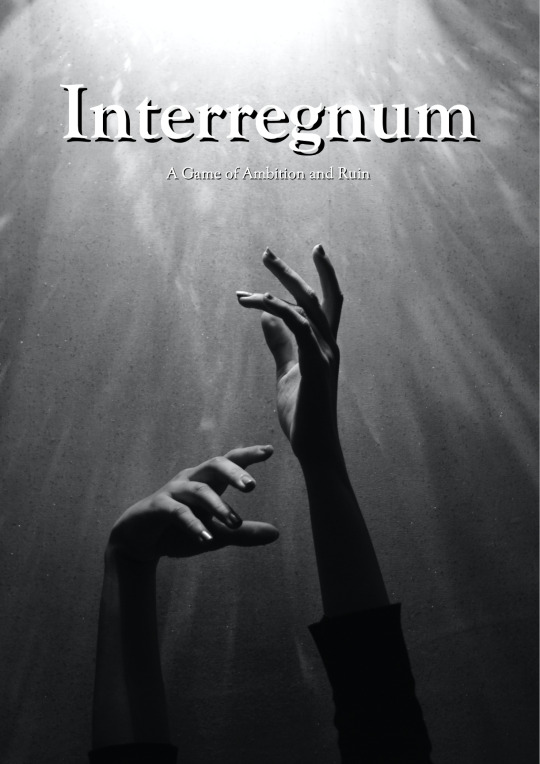

Hearts of Magic, by fading roots.
Fey nobility, arcanist-bureaucrats, and anarchist witches falling for their enemies and getting into messy entanglements amid an undeclared war for control of a magepunk city newly inundated with magical energy.
Play as the Lords and Ladies, the fey noble families of the city, using the fey magic of promises, prophecies, and glamours; The Order, using the arcane techniques of ritual, patterns, and the careful and esoteric arrangement of mundane items; or The Witches, teaching The City to channel raw magic and weave powerful spells.
The object of the game is to create messy entanglements. Fall in love with your enemies, ally with your rivals, fight with your friends. Players will create characters, establish their situations in solitaire scenes, and build scenes using the ten included games. Rules are lightweight and simple, and give you all the tools you need to establish and play scenes, even if improvising dialogue is not your strongest skill.
This game is more about the relationships between the characters than the magic itself; the magic is just the means of navigating those relationships. Hearts of Magic is built from Firebrands, which means that you will play a series of mini games in an order that makes the most sense for your characters, to figure out what happens to them. From the overview of the different mini games it looks like your relationships could be flirtatious or fraught with rivalry; how it plays out it up to you.
Interregnum, by vortiwife.
Interregnum is a playing card-based tabletop game of ambition and ruin set against a backdrop of backstabbing and corporate intrigue. As the Inheritors to a vast Empire, the players must navigate a world of cutthroat politics, forge temporary alliances with their power-hungry rivals, and attempt to destroy those same rivals before they get the idea first.
Sell your soul in a doomed bid for power. Shake hands with your rivals while plotting their demise.
Magic doesn’t seem to be a necessary part of this game, but you can certainly include it if you want to. Interregnum is setting-agnostic: the rules use playing cards and concepts familiar to Blackjack to help you determine how your characters jockey for power. Over the course of the game you will create alliances and incur ruin, falling from grace and making deals with your Empire’s biggest threat just so that you can try and stay in the game. This can be humorous or cutthroat, so make sure that if you pick this game up, you agree as a table on the kind of game you want to play.
Come With A Price, by Blue Maelstrom.
Thinking of the final pleas of his dearest friend, the metal man holds out a gleaming purple crystal, gazing expectantly at the wooden heap. Thinking of her family’s pox-ridden faces, the child lifts her gnarled wooden wand, an identical copy of the one her grandparent had once wielded. Thinking of the lord who took everything from her, the brunette raises her crimson dagger to the heavens. Three words are said, and the inert wood instantly bursts into fiery life, an inferno of brilliant blue lapping against the robes of the assembled coven. The First Deal has been made.
Come With A Price is a rules light tabletop roleplaying game, in which you and your friends join together to craft the story of a coven of witches setting out to make their wildest dreams come true. Together, these witches harness nearly unlimited magical power in order to accomplish feats beyond mortal understanding. Magic demands sacrifice, however, and sometimes deals must be struck so that a witch can get what they want. Making bargains, doing the impossible, and reshaping the world: that is the life of a witch.
While this game is flexible in terms of setting and genre, it maintains that regardless of where your story takes place, magic comes at a price. During character creation, as you make your witches, you’ll brainstorm some kind of scenario that interests your characters. All of your witches will approach this scenario with their own goals; whether or not your character will complete their goal will be determined in play.
The interesting bit that might interest you is the fact that the witches can make deals with other witches to cast the spell for them. When this happens, the spellcaster doesn’t suffer nearly as much from the magic, and the witch who made the deal has to give the spell caster something in return for doing the magic. You’ll likely find yourselves making plenty of deals so as to reduce the toll magic makes on each of your characters - of course, if your witches all have opposing goals, they’ll have to be clever about the deals they make! If you want to hack this game to make it about wizards or magi instead, you probably don’t need to change much.
61 notes
·
View notes
Text
Arael remembered when the halls were beautiful and full of life. Seeing servants, aspirants, Remnant Guard and his brothers walk these halls, conversing and going about their day.
He longed for those days, but they were gone. Now The hallway leading to his Primarch's sanctum were decrepit, falling apart and covered in ancient dried up blood. What made it more disturbing as he walked was the fact that the hall way was still active; specters of the former inhabitants linger. Some crying in the corner eternally, soldiers running by only to disappear in an Unseen explosion, specters of crying children huddled in a corner crying out for their parents that will never come. Down other hallways, he could hear screaming and yelling. They all screamed and pleaded for one thing; the return of the legion to save them from this Fate.
He did his best to ignore all the specters as he neared his Primarch's sanctum. The doors guarded by the corrupted Paladins as their power lances crackled to life.
"I need to speak to our father, another Bastard of Horus is waiting to speak to him." He explained, both Paladins looked at the other, before letting him pass. The doors opened, revealing only darkness within the room with a small light in the distance, walking in, Arael stood as the doors closed behind him. Leaving him darkness save for the far away light.
"What do you wish to speak of my son?" Came a voice that seemed to come from everywhere. The far away light flickered with each word.
"My lord, we have confirmed the Lion has returned and that the bastards of Horus again demand to speak to you."
The Light flickered a bit.
"Hmm, so another of my brothers return. Heh, seems like a family reunion will happen soon."
"Lord Magnus wishes to know if you will join him however, he intends to assault the Fenris system once more."
"No, we have our plans that need to be acted upon. I can feel my legion growing restless, the souls are growing more louder with each passing day. I believe it is time we begin."
Arael was surprised by this proclamation.
"My lord?"
"Ready the legion, we leave our world soon."
"What of the Black Legion?"
There was silence as the light flickered again before disappearing.
"Bring him in."
Within Minutes, a Sorcerer walked in, looking at Arael as the the doors closed behind him.
"Where is he?" He asked, Arael simply looked towards the darkness.
"WHERE IS H-" light flooded the room, the darkness receding away, screaming as it did. The sorcerer tried shielding his eye, as the light was blinding it bypassed the mechanisms in his helmet that blocked such things. Arael simply watched as the light began to form into a being, an armored being that took step towards the blinded Sorcerer.
Thousands of years in the warp have changed Jaune, long did his mortal form break away to reveal his true warp form; A light that burned away the darkness. The Sorcercer screamed in pain as not his flesh and armor were being burned away but whatever was left his soul as well with each step Jaune took towards him until he finally stood in front of him. Jaune was light, light that burned away the Sorcerer.
"We go to the Ultramar realm."
#rwby#jaune arc#warhammer 40k#lost primarch au#jaune is a lost primarch au#warhammer 30k#snippet#wardens of malice
80 notes
·
View notes
Note
For you event for BSD, black butler and genshin impact for any adult male characters
Im a female Sagittarius , my mbti is intj, I have a high pain tolerance. I can actually sing really well but only when I’m alone. I never wanna drink alcohol in my life and I secretly despise it. I’m also an introvert. I’m also Latina and 4”11. I rarely get grossed out. I’m straight . I love horror and rarely get grossed out and I like cats more then people . I have autism. I love watching movies and playing genshin impact. I also like learning and reading . I know English, my Spanish is rusty and the basics of French. I love desserts. Im also Demi which means I can’t fall for someone romantically or sexually until their is a emotional connection . We have to be friends first. I love the dark and macabre. I prefer a cafe to a concert for a date.


I match you up with . . . ♡

˚ ༘♡ ⋆。˚ ❀ Edgar Allen Poe | Bungo Stray Dogs
Poe was the first character that came to mind because much like you, you are introverted, have a love for the macabre and of course, for reading. I have headcanoned Poe as a demisexual as well, so he can relate to you on a personal level.
As someone who doesn’t like big crowds, he would find himself coming out of his shell more when its just the two of you - he will most likely want you to read any and all novels he has written. He would take you to a nice, quiet cafe and would beg ask you to read over his works.
As much as he would get excited over sharing common interests, he will also take a keen interest in your hobbies that he himself has not partaken in; such as Genshin Impact. He could happily watch you play, and if you explain the game mechanics to him (in particular the wish system) he would absolutely become an enabler when it comes to purchasing wishes. - the man has got money $$$
You log in one day and see that you have a ridiculous amount of primogems and you kinda just ??? - which Poe may play coy and say some shit like “oh that is a mystery~” like yeah, right, a total mystery, Mr Money Man.

˚ ༘♡ ⋆。˚ ❀ Sebastian Michaelis | Black Butler
Phew, what to say about this man. I will start with the obvious that the both of you prefer the company of cats rather than people; something you both can closely relate to. Once the both of you get closer to each other, he would absolutely show you his collection of cats that he keeps hidden away. They are his pride and joy after all.
As someone who regularly tutors Ciel, he would be more than happy to help you in learning another language, especially in French. Sebastian is fluent in a few languages, including french, so if you were to ask him, he would absolutely teach you. As for Spanish, I am sure he would be just as enthusiastic to learn with you.
He would encourage you to sing! I can imagine him one night walking down the corridor and hearing a sweet voice singing, your voice. He would hide behind your door and listen to you for a while, smiling to himself. If he ever walks in on you whilst singing, he would definitely tease you, but ultimately would encourage you to sing more, especially to him.
Oh and one last thing, if you tell him you like desserts, he would ensure to make an extra portion whilst baking for his young lord, Ciel. He would either wait till he has done serving his master to give it to you in person, or he would deliver it to your door, wrapped up nicely with a bow; which is attached to a little love note.

˚ ༘♡ ⋆。˚ ❀ Kaedehara Kazuha | Genshin Impact
The first person I had in mind to match with you was Kazuha. He is a gentle soul that is quiet, at least at first. He is someone I can imagine would prefer to get to know people on an emotional level before getting into a relationship.
Kazuha is known to be a bit of a poet, and would regularly write haikus - and if the both of you get comfortable enough with each other, he would gladly show you some of his works, even if he doesn’t think they are any good.
As someone like myself who also has autism, I would say Kazuha is one of the most emotionally understanding characters of Genshin; coming across as someone who is sensitive to your needs. Kazuha has a very easy-going personality, but is also determined to help and support his friends - honestly he is the perfect example of boyfriend material!
If you ever did feel comfortable in singing in front of Kazuha, he would happily play his Shibabue and whistle to the rhythm. Kazuha loves music and believe me, he’d love to hear you sing.

#Baizhoobies matchup event#Sebastian Michaelis x reader#kazuha x reader#edgar allen poe x reader#Poe bsd x reader#match up event
20 notes
·
View notes
Text
Lord of Heresy and Despair: Sifkesh, the Sacred Whore

CR 28
Chaotic Evil Medium Outsider
Adventure Path: Wrath of the Righteous: Demon's Heresy, pg. 86-87
WARNING: In addition to despair and heresy, Sifkesh is also the Demon Lord of Suicide. I bring this up because it is reflected in her kit, her lore, and especially in her Divine Obedience and Boons. It is impossible to discuss her stats without mentioning this part of her portfolio. Do not read into her if you are especially sensitive to such subjects.
Among the strangest and most enigmatic of all Demon Lords, it's believed that Sifkesh was once a powerful Erinyes Devil that turned her back on Hell and became one of of the first of the devils to betray Asmodeus. Her two largest lore blocks (in the Complete Book of the Damned and the above-mentioned pages in WotR) are frustratingly vague thanks to the complexity of both her statblock and her Boons taking up the majority of each source, but it paints a gruesome enough picture of this fiend: A great many Demon Lords are gluttonous, or greedy, or heretical, but Sifkesh is on an entirely different level. She does not just embrace heresy, she is heresy in every aspect of her being, so thoroughly that she's heretical to cosmic order... and even the game's mechanics.
I say 'heretical to the cosmic order' because the Sacred Whore isn't just a Demon Lord in her behavior; she destroys like a demon and especially prizes destroying faiths and places of worship (regardless of alignment), but she plots and corrupts like a devil, misleading mortals and poisoning their faith and hope though lies and false guidance with the ultimate goal of weakening the faith's standing in the eyes of the public, if not destroying it entirely. She can spend patient years molding powerful and influential men and women of the cloth into perfect servants of hers, weaving heresies and blasphemies into their beliefs until something--typically another person of equal standing in the same faith--causes the scales to fall from their eyes. By then, though, it's far too late; their souls are too stained to join the god they believed they were serving in the afterlife, and in horrified despair they're driven to take their own lives... at which point Sifkesh seizes their soul and consumes it, denying their soul to any afterlife, even her own.
Demon, devil, daemon--destroyer, corruptor, devourer. Sifkesh plays as all three in equal measure... making her and her minions a very flexible BBEG in a campaign where religious horror and corruption is the main threat. Direct worship of Sifkesh is noted to be 'incredibly personal' for reasons only grimly alluded to, and as such her "cults" tend to consist of 2 or 3 individuals infiltrating larger cults and withering them from within... even other evil cults. The Sacred Whore doesn't play favorites, and even her fellow Demon Lords aren't immune to her antics.
But enough about the havoc she wreaks in the mortal world, let's see what she can do once you pull back the curtains and engage her directly...
In contrast to the other feminine demons we've seen stated out so far, Sifkesh isn't a seductive manipulator who seeks to avoid combat and, if combat is inevitable, becomes an obnoxious ranged/DoT fighter! Instead she's an overt manipulator, using Suggestion at-will to command everyone around her to make her job easier. She's even got the Quickened version 3/day to gently convince people to throw their weapons and shields inside so she can more easily peel them apart with her hideous razor and sharpened claws, and if she's especially impatient, there's Quickened Dominate Person at 3/day to simply seize control of anyone who fails a DC 28 Will save.
These aren't the only notables among her spell-likes, though; Symbol of Strife is unlikely to work on players powerful enough to encounter her but does wonders for turning their summons on their masters and twisting lower-level NPCs to madness, and though she has it only 1/day the DM can easily handwave multiple onto her chosen battlefield if she's seen the players coming (and she likely will, given how subtle her work usually is; it gives her plenty of time to know who's interrupting her plots). Once active, the Symbol will radiate waves of hatred out until their duration expires or they've affected a combined total 150 HP of creatures, meaning that anyone who's dropped below that threshold by, say, Sifkesh's Full-Attack, becomes vulnerable to turning on their friends.
Which typically means "after one round of attacks."
While the aforementioned lady demons weren't as powerful in melee as they were at a range, Sifkesh shows them up by being equally strong in both. Her weapon of choice, a +5 Unholy Speed War Razor, deals 1d4+27 damage (+2d6 vs Good targets) with every strike (5 a round thanks to the Speed enchantment), and during a Full-Attack she can also choose to swipe once with her sword-length claws for 4d6+27 damage as well. Her claws also cause hideous, rending scars in the victim's body and soul, forcing them to make a DC 41 Will save or become afflicted by 1d4 Charisma drain. Even success on the save causes sickness for 1 round, but failing enough times in a row has an even worse punishment: being reduced to 3 or less Charisma curses the victim with self-destructive depression, which causes them to automatically fail ALL saves against Sifkesh's spell-like AND supernatural abilities until the drain is healed. Suddenly, her Quickened Dominate Person goes from threatening to battle-warping, and her 1/day Weird goes from a nuisance to a party wipe.
How's it a party wipe, you may ask? Because she can use Whirlwind Attack to slash the entire party at once with her claw and then see who's the most miserable afterwards and focus them down until they're rendered catatonic by the damage or the drain. She's resilient enough to be patient and make sure she can get everyone who's a major threat with a single casting. "But wait," I hear you say, "she's Medium! She has a 5ft reach, so all we need to do is--"
Be 40 or more feet away. You may notice that Sifkesh's limbs aren't actually sticking to her! Her Detached Limbs simply float near her body for the sake of convenience, and while this makes her immune to any effect that would sever her limbs or head, the more important part is that she can launch her limbs out and rapidly retract them as she attacks, giving her a 30 foot melee reach. Heretical to the game's rules, remember? She has an enormous threat radius for a Medium creature and she can easily take advantage of the fact the players might not realize just how far she can slap them from by using Combat Expertise for extra AoOs, draining Charisma from people trying to get into position or cast spells even when it's not her turn and using Whirlwind Attack to deliver a single massive cleaving claw attack when it is. Her claw's massive damage, reach, and Charisma drain also makes her Spring Attack more obnoxious, though with her 120ft fly speed, a DM wanting to up her potential annoyance factor could swap Spring Attack for Flyby Attack.
Despite using a lightweight finesse weapon Sifkesh has no Sneak Attack damage, so she doesn't get as much use as, say, Shax and Nocticula do from Time Stop + Summon Demons, and she's certainly no Shamira or Kostchtchie when it comes to setting up shenanigans during stopped time, typically delegating it to either an escape or an engage tool, plopping herself in the middle of a party so her whirlwind of limbs can peel them apart. Despite her leather duds, Sifkesh is significantly harder to hurt than almost any other demigod of similar status; she not only has the Demigod Suite of immunities (death, charm/compulsion, petrification, energy drain), but one very special and specific immunity that is likely to make at least one person in the party froth at the mouth with rage: Complete immunity to slashing weapons.
Her body breaks open and folds around any incoming slashing weapons, negating their damage AND abilities entirely. No swords, no axes, no sickles and scythes, and certainly no using her own weapons against her. And adding onto the 'heretical vs game rules' is the second half of her protection against weapons: Sifkesh absorbs critical hits from any source, be it a weapon or spell. Her Critical Healing restores HP equal to the extra damage she would have taken from any critical hit, so the higher your weapons' crit modifier, the more healing she gets from this ability. Maybe it's a good thing that scythes can't critically hit her...? Slashing weapons don't work at all, and piercing weapons tend to rely on their critical ratio/modifier, which means you can end up healing her more than hurting her... which just leaves the humble bludgeoning instruments. Greatclub gang rise up! Provided that bludgeoning weapon can bypass her DR 20/Cold Iron, Epic, and Good.
The good news is that at least Sneak Attack still works on her!
But here's more bad news: the indirect resilience granted to her by her Despairing Cry making her even more infuriating to harm! This is a swift action she can take once ever 1d4 rounds to fill everyone within 60ft with unrelenting despair. Any creature that succeeds a DC 38 Will save is sickened for 1d4 rounds, but anyone who fails is slapped with 24 entire hours of hopelessness, instilling a -6 penalty to attack rolls, damage rolls, saving throws, ability checks, AND skill checks. Anyone under the effects of the Despairing Cry has any immunity to fear suppressed (making them vulnerable to, among other things, her Frightful Presence and Weird) can also be convinced via Suggestion, Charm effects, or Dominate effects to take suicidal actions without penalty or the ability to resist the impulse, potentially saving her time by convincing party members to do themselves in for her.
There is, of course, even further heresy against the rules of the game, but before we cover that final part of her kit, her literally Heretical nature bolsters her Spell Resistance from 39 to 41 whenever she's targeted by Divine magic, and boosts her saves from 30/33/30 to 32/35/32 against such spells as well. Any Divine caster that touches her (like literally any one of them trying to use a powerful Domain ability or touch spell) also risks becoming nauseated, leaving them open for her retaliatory Full-Attack, shutting off yet another common angle of attack.
One of the most resilient of all Demon Lords, Sifkesh has counters for almost every vector an average party can come up with, necessitating some extremely specific weapons, spells, and playstyles. Have you ever tried fighting an enemy you didn't want to critically strike? But do you want to know the most frustrating part about all of it? You might have to do it all twice, because once per day as an immediate action, Sifkesh can drop all her defenses against an incoming attack or spell, becoming flat-footed and losing her profane bonus to her AC. Her Spell Resistance drops to 0, and she automatically fails any saving throw she makes against that attack or spell.
As you may be able to guess, it's a trick. But it's one you have no choice but to walk into, because she can trigger this ritualistic Suicide as an immediate action against anything she has reason to believe may be able to kill her. If the attack DOES kill her, not only does she unleash an empowered version of her Despairing Cry (which stuns anyone who fails the save for 1d4 rounds), but one round later she's brought back to life at full health, making her the only Demon Lord that has to be killed three times in one year to make her death stick. Perhaps this is why, despite her behavior flaunting the very rules of reality and with her gleefully corrupting even the cults of other Demon Lords, she has yet to be ousted as the Lord of Heresy.
You can read more about her here.
36 notes
·
View notes
Text
Music For the Soul by Alexander MacLaren

The Captain of the Lord's Host
"And He said, Nay; but as Captain of the Host of the Lord am I now come." – Joshua 5:14
The army of Israel was just beginning a hard conflict under an untried leader. Behind them Jordan barred their retreat, in front of them Jericho forbade their advance. Most of them had never seen a fortified city, and had no experience nor engines for a siege. So we may well suppose that many doubts and fears shook the courage of the host as it drew around the doomed city. Their chief had his own heavy burden. He seems to have gone apart to meditate on what his next step was to be. Absorbed in thought, he lifts up his eyes mechanically, as brooding men will, not expecting to see anything, and is startled by the silent figure of " a Man with a sword drawn " in His hand, close beside him. There is nothing supernatural in His appearance; and the immediate thought of the leader is, "Is this one of the enemy that has stolen upon my solitude?" So, promptly and boldly, he strides right up to Him with the quick challenge " Whose side are You on? Are You one of us, or from the enemy’s camp?" And then the silent lips open: " Upon neither the one nor the other. I am not on your side, you are on Mine, for as Captain of the Lord’s host am I come up." And then Joshua falls on his face, recognises his Commander-in-Chief, owns himself a subordinate, and asks for orders. "What saith my Lord unto His servant? "
"The Captain of the Lord’s host." He Himself takes part in the fight. He is not like a general who, on some safe knoll behind the army, sends his soldiers to death, and keeps his own skin whole; but He has fought and He is fighting. Do you remember that wonderful picture in two halves, at the end of one of the gospels, " the Lord went up into Heaven and sat at the right hand of God, . . . they went forth everywhere preaching the word? " Strange contrasts between the repose of the seated Christ and the toils of His peripatetic servants! Yes! Strange contrast; but the next words harmonise the two halves of it: " The Lord also working with them, and confirming the word with signs following." The Leader does not so rest as that He does not fight; and the servants do not need so to fight as that they cannot rest. Thus the old legends of many a land and tongue have a glorious truth in them to the eye of faith; and at the head of all the armies that are charging against any form of the world’s misery and sin there moves the form of the Son of Man, whose aid we have to invoke, even from His crowned repose at the right hand of God. " Gird Thy sword upon Thy thigh, O Most Mighty, and in Thy majesty ride forth prosperously, and Thy right hand shall teach Thee terrible things."
7 notes
·
View notes
Note
i don't know how tumblr works so forgive me if i made this prompt in the wrong place
so uhh.... a fic based on number 43 from the intimacy prompt list for mara/shaxx 👉👈
43. Falling asleep with their head in your lap Woe, my very specific headcanons for Mara/Shaxx (and by extension, Mara/Sjur) be upon thee!
Queen Mara Sov drapes against the arm of the blue silk divan, a book of ancient poetry open in her right palm, the stubbled and scarred jawline of Lord Shaxx beneath her left fingertips. He rests his head in her lap, atop the smooth leather of her cuisses, dark eyes half-lidded with exhaustion. Through the high windows of the quarters, a twilit blue-purple sky, stars flickering through the vast dust and debris clouds.
In his role as liaison to the Reef in the Great Hunt, Shaxx had come to Mara to report on the lightbearers' progress across the myriad rocky bodies where the wish-dragons had roosted. Off-duty, he stayed to get caught up on the happenings in Mara's life and share his own. The conversation avoided matters of Reef or City news, which Mara appreciated; the Hunt and its attendant diplomacy with the capricious guardians and her own restless subjects wracked her nerves. To talk about the latest productions of the Ghost Community Theater Company and her recent library acquisitions was a welcome reprieve from the grim day-to-day.
"'A grave, a grave,' Lord Barnard cried," she recites from an old Earth poem telling the story of a roguish man, a married woman, and a love triangle that ends in a deadly duel. "'To put these lovers in; but lay my lady on the upper hand, for she came of the better kin.'"
"Is this your way of issuing a warning, Queen Mara?" he asks with good-natured incredulity.
She huffs stiffly. "Unless one of us is a disguised ahamkara, we needn't fear the wrath of the Tempest."
Mara pictures herself and Sjur as two planets circling a star in slightly irregular orbits. Sometimes, celestial mechanics draw them to blissful conjunction, and other times they drift into peaceful divergence. They will always reunite, so there is no sorrow in the matter, no more than Terra mourns Mars when he surpasses her. With the awareness that others may track in and out of their lives like passing comets, there is no jealousy. And no sense of possession over that which cannot be owned.
"I cannot speak for you, but the twinkle in my eyes is merely joy at spending time with you," he assures, right hand idly stroking her bony knuckles. She flips her hand palm-up to lace with his. "Still, I wouldn't decline a rematch. In all my days as warlord and crucible-master, I've never before encountered a fighter of such skilled ferocity. You are fortunate to have her, and the ahamkara are unfortunate to stand in her way."
She trusts Sjur will stand strong against the dragons; she has conquered foes more fearsome and less familiar. Still, Mara anxiously awaits transmission for confirmation that the Queen's Wrath has endured another day unharmed.
"I do not think another living soul would volunteer to stand opposite Sjur's bow," Mara smirks.
He smiles. "We guardians are an odd sort. You know that."
"I do," she says, not finishing her thought: but you aren't, and that's why I like you so.
In a world of reckless children afire with the power of gods, Shaxx is measured, empathetic, diplomatic. Worthy of the trust she so carefully meters out. The lightbearers would do well to be more like him.
She almost says so, but finds his eyes closed, breath slow and steady. Setting the book on the arm of the lounge, she shifts so that her arm tucks around him, and her head rests on his chest, accompanying him in slumber.
18 notes
·
View notes
Text

𝘔𝘰𝘳𝘣𝘶𝘴 𝘋𝘢𝘦𝘮𝘰𝘯𝘪𝘤𝘶𝘴 - 𝘋𝘢𝘦𝘮𝘰𝘯𝘴 𝘰𝘧 𝘒𝘩𝘰𝘳𝘯𝘦
Though the effect of the Chaos Gods and their daemons is undeniable within the material world of Warhammer, the reality is that the vast majority of the endless Great Game takes place within the Warp, usually on the margins of a God's territory or within the Formless Wastes unclaimed by any but those few stalwart souls strong enough to maintain hellish fiefs and kingdoms in the spaces between the Godly Kingdoms.
And so it must follow that with his fellow gods and daemons as his primary enemies and his titles of Plaguelord and Master of Poxes being his foremost aliases, Nurgle's poxes must be concocted with the aim of weakening and killing his fellow daemons. Daemon-specific illnesses are unique in that, similar to Nurgle's rot, they target the soul itself rather than just the flesh. While daemons are said to be immune to mortal diseases, the mechanisms of the rot suggest that this does not encompass total immunity to all diseases.
And some of the most difficult daemons to infect and dispatch are the Children of Khorne. Khorne's tertiary aspect is a God of Fire, an element well known to scour even the most microscopic of life from the face of the world. Fire is particularly effective against Nurgle's forces, as it neutralizes their regenerative abilities and drastically lessens their infectivity. Add onto this that Khornate daemons are uniquely magic-immune as other daemons are not and a magic-based pox is particularly loathe to infect them.
However, determination is not just an aspect of the Blood Lord and to go along with it, Nurgle has diligence, patience, passion for his craft. With time, even the blood-hungry daemons of Khorne can fall to the poxes of the Plaguemaster.
Brass Rot
Brass Rot is one of the earliest successes to spring from the Plaguemaster's Cauldron of Maladies. Carried into war on the blades of Plaguebearers and Great Unclean Ones alike, it enters into the body through wounds made by such weapons. Eventually, the afflicted Khornate daemon notices their skin begin to rust and pit, turning brown like old blood or verdigris like oxidized metal. The active period and severity rate vary drastically; some cases are minor, with effects being largely cosmetic or limited to the lost of a few fingers or horns. Others are more serious loss of entire limbs, deep-tissue infections that interfere with organs, or a completely rusted state of paralysis. It bears some resemblance to gangrene or necrosis in humans.
Brass Rot's only flaw is it's very low infectivity rate from victim to victim. Afflicted individuals tend to not spread their disease, so while hailed as the first illness to afflict Daemons of Khorne broadly, it's sub-par infectivity makes it among one of Grandfather's least favorites. Still, some Plaguebearer Tallybands still carry this loathsome disease within their swords and rashes of it are known spring up every now and again in the Realm of Khorne.
Furor Cough
The Furor Cough was a "gift" from Nurgle to Khorne spawned after a perceived betrayal of the former by the latter. It was first discovered in the Blood God's beloved Flesh Hounds, a cruel disease that begins as a fairly innocuous cough, not dissimilar to kennel cough. This is where the disease gets it's name, but the prognosis is much more dire than a mere cough. This is followed by lethargy interrupted by increasingly frequent bouts of agitation and a loss of the Flesh Hound's normally impeccable balance as it descends into delirium. It finally becomes hydrophobic, salivating constantly and driven into violent hysterics when presented with water-- or blood. Spread through biting, Furor Cough is noted as being the first of the Khornate-viruses to to draw noticeable apprehension from the Daemons of Khorne.
Not at all restricted to Flesh Hounds, the disease can infect everything from Khornate Furies to mighty Bloodthirsters of Khorne and bears the most resemblance to the mortal Rabies disease. Unlike Rabies, however, it is not virtually fatal in all cases. The Khornate body undergoes a dramatic septic reaction in order to rid itself of the disease and while it might be successful, the damage to itself is also done. Cool blooded (hypothermia) and half-mad, very few Khornate Daemons who catch this disease recover to resume their old lives and none at all make a full recovery.
It was the Furor Cough that heralded the birth of the Slayers of Plague. While other denizens of the Ragelands fight mindlessly and for the sake of fighting, the Akhamshy'y'Nurgh specifically seek out and destroy Packs of Flesh Hounds thought to be infected by the virus.
Axeworms
Poxes are not the only things that the Plaguefather creates. He is also a connoisseur of Biological Weapons, though if asked he would claim this is a more of a dabble than a true trade. Axeworms are so named for their double-axe shaped heads and the amount of damage they can do when they enter the body. They are a Khornate specific parasite and contracted primarily during Khornate invasions within Nurgle's realm, namely his garden. Some Nurglish daemons act as intermediary hosts to these worms, resizing and multiplying within it's carrier's blood. When a Khornate kills the host and drenches itself in their life fluids, the worms are transferred to the Blood Daemon's skin, where they burrow into the body. Daemons of Khorne are their definitive host; these worms will remain in a dormant state if they find themselves within another type of daemon or even a mortal.
The Axeworms feed on blood, multiplying and enlarging itself as it feeds on the essence of it's Blood Daemon host whilst it violently rips its way through it's hosts flesh. Not only that, but it is a behavior-altering parasite, and one that causes the Blood Daemon to turn without warning on it's own kind. Since this behavior isn't abnormal among Khornates, detecting them is difficult, though chronic aches and pains are common. If the Infected Khornate is winning it's fight, it will continue to kill until there is nothing left but itself, then find more victims. However, if it is losing, it turns it's sword on itself, and sprays it's fellows in it's own infected blood as it lops off it's own head, spreading Nurgle's parasite and dishonoring the daemon it infected in one sweep of it's sword...
#warhammer fantasy#warhammer 40k#nurgle#khorne#pars infectus (nurgle headcanon);#Merry Maladies (Cauldron Concoctions);
6 notes
·
View notes